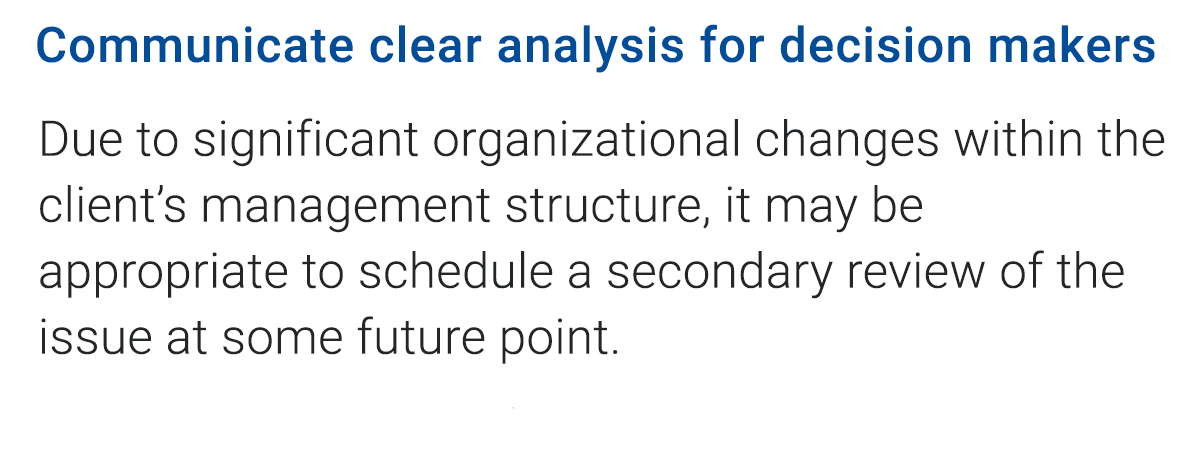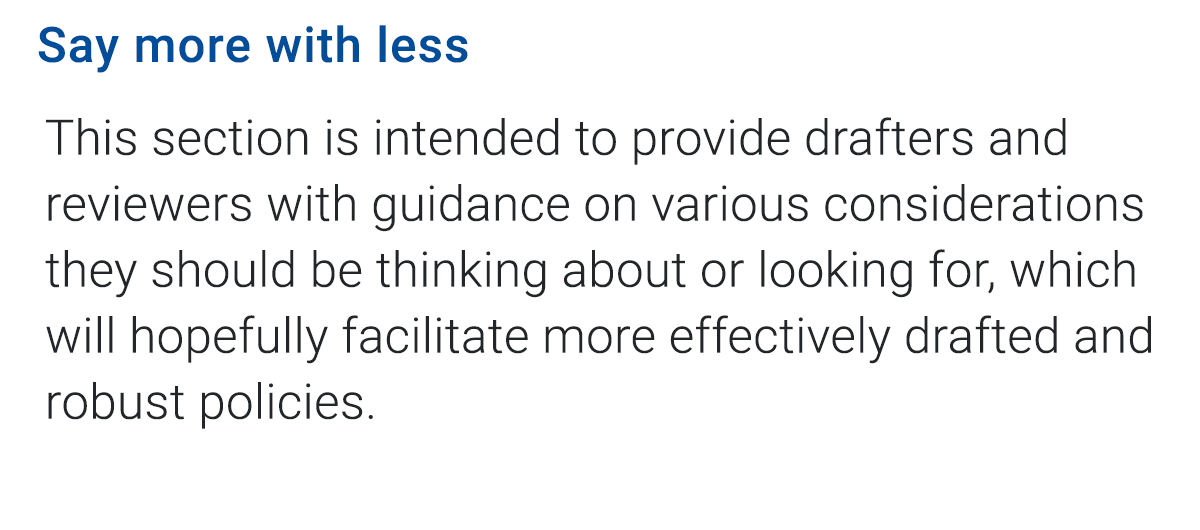Transform how government does business
Our courses drastically improve the documents that drive government and quasi-governmental bodies—policy writing, briefing notes, legislation and bylaws, investigation and decision documents, and more.
Training that’s specific to your world
We know government’s style, unique requirements, and writing and review process. This training is the product of decades of work and conversation with writers, reviewers, decision makers, and readers.
Government and regulatory training
-
We teach internationally established best practices for clarity, as well as a new staged process to help participants reduce writing and review time.
We suggest taking the core course before our document- or skill-specific training because it covers foundational content.
-
These courses teach writers how to:
work skillfully with key documents that governments and regulators produce regularly, like briefing notes and decisions
avoid the pitfalls for that document type
write clearly and quickly under pressure
use templates effectively
gain from others’ experience with these types of documents
-
These courses focus on and strengthen certain skills your team may need, depending on what they write. These include:
editing and proofreading
delivering negative messages
writing complex documents with multiple drafters
Ask us if you need a course you don’t see here.
-
If you prefer to work at your own pace, check out our online school. We offer:
a roughly 12-hour course called Briefing Note Fundamentals
coffee-break courses that are densely packed mini modules you can take in 40 to 60 minutes
Our current coffee-break courses are:
Why workplace writing is difficult and often unclear (it’s not you)
How to structure documents for readability
The best style for modern workplace writing
More coming soon!
Choose training that fits your needs
We offer on-site training, live webinars, and self-paced online courses. Each workshop is customized to your organization and group.
Our workshops
Some of our clients
Alberta Energy Regulator
British Columbia Financial Services Authority
British Columbia Securities Commission
Canada Energy Regulator
Canadian Human Rights Commission
Canadian Investment Regulatory Organization
Cities of Calgary, Edmonton, Red Deer, Vancouver, and more
Civilian Review and Complaint Commission for RCMP
Federal and provincial governments (across nearly every ministry)
Local Government Administrative Association of Alberta
Mackenzie Valley Environmental Impact Review Board
Municipal governments across Canada
Nunavut Impact Review Board
Office of the Veterans Ombudsman
Ombudsman for Banking Services and Investments
Workers’ Compensation Board
Core courses

-

Effective Writing for Government
Learn the core skills government writers need to create clearer, more readable documents faster.
-

Effective Writing for Government Level 2
Deepen principles from Effective Writing. Participants apply what they learned to more complex examples.
-

Effective Writing and Reviewing for Managers and Leaders
A condensed version of Effective Writing with a focus on leaders’ needs and how to give clear, useful feedback to writers.
Courses for specific documents
-

Effective Briefing Note Writing
Deliver strong, concise analysis decision makers can trust
-

Effective Investigation Writing
Build reports that are concise, well-structured, supported by evidence, and readable
-

Effective Policy and Procedure Writing
Write coherent, easy-to-implement policies and procedures that improve compliance
-

Effective Decision Writing
Build a persuasive relationship between mandate or law, evidence, and findings
-

Effective Email Writing
Write emails that are task-focused, easy to read, and get the results you want
Courses in specific skills
-

Effective Editing and Proofreading
Understand the fundamentals of efficient reviewing (and reduce process time significantly)
-

Deliver Negative Messages Skillfully
Write professional and respectful messages when readers may not want to hear what you have to say
-

Build Strong Rationale
Focus on creating strong, evidence-based analysis in any type of document
-

Write Effectively as a Team
Make decisions early to create consistent, clear, well-ordered content when writing collaboratively
-

Write to Persuade
Learn to write in a powerful, compelling, and clear style and build a reputation for clarity
What we teach your people to do




















